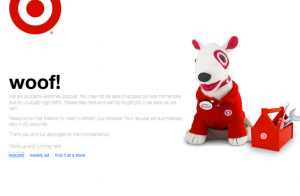 For about five months now, MNsure ads have repeatedly told us: “Minnesota is the land of 10,000 reasons to get health insurance.” To educate us of this fact, the ads have portrayed a variety of health calamidies befalling Minnesota icon Paul Bunyan. Incidents involving crushed private parts are particularly popular.
For about five months now, MNsure ads have repeatedly told us: “Minnesota is the land of 10,000 reasons to get health insurance.” To educate us of this fact, the ads have portrayed a variety of health calamidies befalling Minnesota icon Paul Bunyan. Incidents involving crushed private parts are particularly popular.
MNsure’s ad agency seems convinced that as soon as Minnesotans understand that they could face Bunyan-esque health problems without health insurance, they will surf on over to mnsure.com. But at this stage of the game, that message isn’t sufficient. Repeatedly telling Minnesotans that coverage brings treatments is like telling us that parkas bring warmth. We get that. If Minnesotans somehow didn’t know that self-evident fact before the MNsure ads, they darn sure do five months into the multi-million dollar campaign.
So how about we share some motivating information that many DON’T know?
Sharing New News About MNsure
For example, the ads could tell Minnesotans that if they don’t get coverage by March 31st, they have to pay a large government penalty. That would seem to be a pretty motivating piece of information, and research shows that about a third of the population doesn’t know about the penalty, and 8 out of 10 don’t know about the deadline.
Or the ads could explain how health coverage has never been more affordable for thousands of Minnesotans. That also would seem to be a pretty motivating fact, yet research shows that a whopping 69% of Americans don’t know about new premium tax credits and other financial assistance. Among the young people who are so key to making the Obamacare risk pools stable, awareness about financial assistance is even lower.
Minnesota has a particularly good story to tell on the affordability front, because MNsure is offering the lowest premiums in the nation. So, why isn’t MNsure telling that story?
“Newly affordable” and “mandatory a few weeks from now” are messages that are motivating and new news. And as far as I can tell, they are missing from MNsure’s current ads.
Bye Bye Bunyan
So it’s time to retire the sophomoric Paul Bunyan hilarity. As MNsure enters the home stretch toward the March 31st deadline, it should switch to a much more utilitarian message. Rough example:
Young adult:
Why did I use MnSURE to get health coverage? Not because I think buying insurance is fun. It’s no more fun than buying car insurance, which I also have to do.
No, I did it to avoid a double hit.
First I did it to avoid a looming government penalty. If you haven’t heard, there is a big penalty that kicks in March 31 for anyone who isn’t covered. And it gets bigger over time.
Second, I did it to avoid the crippling medical bills that can come from being uninsured.
And the good news is, getting coverage on MNsure was more affordable than I expected. Minnesota’s MNsure site offers the lowest average premiums of any state, and over two-thirds of the uninsured are eligible for help to make coverage more affordable.
So, no missed deadline. No penalty. No medical bankruptcy. And more affordable than I expected. www.mnsure.com
I’m not an ad copy writer, so someone can write a much better ad than this. But you get the general idea.
When the MNsure ads launched in September 2013, the light approach maybe made sense. Five months later, WE GET THE JOKE ALREADY. Now it’s time for MNsure to tell Minnesotans some things they don’t already know.
– Loveland
Note: This post was also featured in Politics in Minnesota’s Best of the Blogs.



